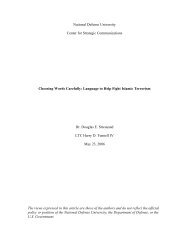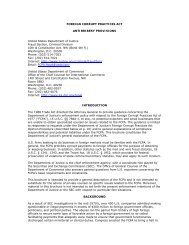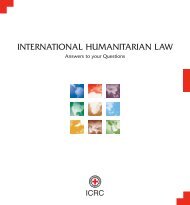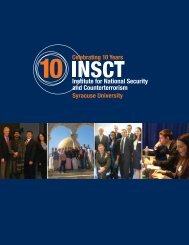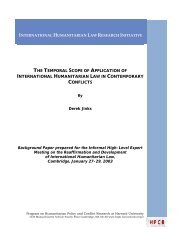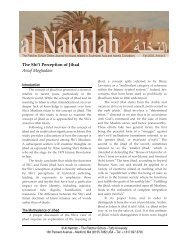some reflection on post-enlightenment qur'anic hermeneutics
some reflection on post-enlightenment qur'anic hermeneutics
some reflection on post-enlightenment qur'anic hermeneutics
You also want an ePaper? Increase the reach of your titles
YUMPU automatically turns print PDFs into web optimized ePapers that Google loves.
Special] Post-Enlightenment Qur’anic Hermeneutics 1421I c<strong>on</strong>tend that, in spite of the rhetorical force and intellectual power ofthe various Post-Enlightenment projects, n<strong>on</strong>e has had an overwhelminglypositive recepti<strong>on</strong> in the traditi<strong>on</strong>al scholarly community and am<strong>on</strong>g thebelievers. It appears that the great majority of Muslims, in the West, the FarEast, in Africa, and in the Arab heartlands of Islam c<strong>on</strong>tinue to cleave totraditi<strong>on</strong>alist understandings of the meaning of the Qur’an, even thoughmany of those understandings frequently leave Muslims greatly unsatisfied.Led by a few scholars of Islam, <str<strong>on</strong>g>some</str<strong>on</strong>g> segments of the Western popularpress and intelligence and military communities have claimed that the“Islamist” tafsir, referred to above, is c<strong>on</strong>vincing an increasing number ofMuslims of its claims. 68 They assert that this hermeneutical approach isfueling the development of a “jihadist” ideology that seeks to violently removeWestern influences from the Islamic world and reinstate the pristineIslam of the formative years, with extremely negative c<strong>on</strong>sequences. 69Although probably exaggerated, these asserti<strong>on</strong>s may bear <str<strong>on</strong>g>some</str<strong>on</strong>g> truth,in the sense that the “jihadist” hermeneutic is filling a void created by theunsatisfying impact of the more mainstream and traditi<strong>on</strong>al <strong>hermeneutics</strong>. Itis my view, however, that all of these projects, including the Islamist hermeneuticalproject, have so far failed to spark the kind of discourse in Islamicjuridical and religio-political affairs that would help to put the newtafsir in the dominant positi<strong>on</strong> that such literature has traditi<strong>on</strong>ally played. 70N<strong>on</strong>e has become can<strong>on</strong>ical. More significantly, each genre of the tafsir Ihave described appears in Arabic, Urdu, Farsi, or in a Western EuropeanAND HAMID ALGAR (1983); CHARLES C. ADAMS, ISLAM AND MODERNISM IN EGYPT, supranote 59; MAHMOOD AHMAD GHAZI, ISLAMIC RENAISSANCE, supra note 59; MALCOLM KERR,ISLAMIC REFORM, supra note 59; CHRISTIAN W. TROLL, SAYYID AHMAD KHAN, supra note 59.68. For examples of such scholarship see generally SANDSTORM: MIDDLE EASTCONFLICTS & AMERICA (Daniel Pipes ed., 1993); BERNARD LEWIS, CRISIS OF ISLAM: HOLYWAR AND UNHOLY TERROR (2003); BERNARD LEWIS, ISLAM AND THE WEST (1993); BERNARDLEWIS, WHAT WENT WRONG: THE CLASH BETWEEN ISLAM AND MODERNITY IN THE MIDDLEEAST (2002); DANIEL PIPES, MILITANT ISLAM REACHES AMERICA (2002).69. See, e.g., Paul Berman, The Philosopher of Islamic Terror, N.Y. TIMES MAG.,Mar. 23, 2003, at 24; see also IBRAHIM M. ABU-RABI’, INTELLECTUAL ORIGINS OF ISLAMICRESURGENCE IN THE MODERN ARAB WORLD (1996); JOHANNES J.G. JANSEN, THE NEGLECTEDDUTY: THE CREED OF SADAT’S ASSASSINS AND ISLAMIC RESURGENCE IN THE MIDDLE EAST(1986); Ayman al-Zawahiri, On the Islamist Revoluti<strong>on</strong> in Egypt (January 2002), in ANTI-AMERICAN TERRORISM AND THE MIDDLE EAST: UNDERSTANDING THE VIOLENCE 69 (BarryRubin & Judith Colp Rubin eds., 2002).70. Tafsir published during the classical period also often appeared in resp<strong>on</strong>se todiscourse <strong>on</strong> issues of the day, particularly theological c<strong>on</strong>cerns, such as predestinati<strong>on</strong>, the“createdness” of the Qur’an, and the legitimacy of Shi’a theology and theories of governance.Perhaps the best example of this is the twelfth century Mu’tazilite tafsir of Zamakhshariwhich has become a standard classical reference work for exegetes of the Qur’an. SeeRippin, supra note 9, at 8953. Perhaps it is still too early in the current development of thePost-Enlightenment tafsir to determine whether any of the genres I have described will takehold and become can<strong>on</strong>ical.



